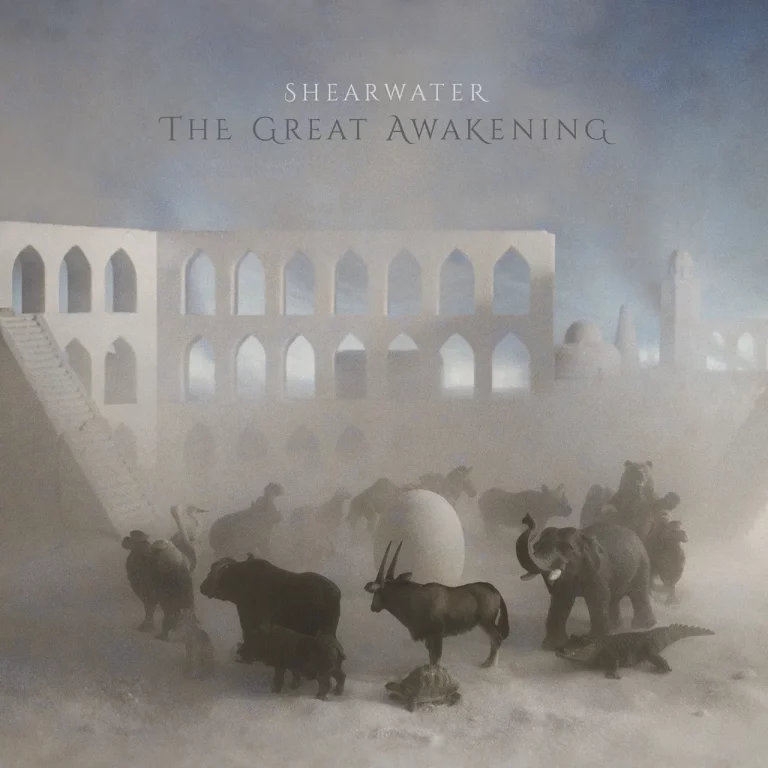The natural world is filled with terrifying, beautiful, and unknowable spectacles, and so it makes sense that avowed nature lover and well-known ornithophile Jonathan Meiburg would mold the ongoing sound of Shearwater around these primal themes and associations. On past records, he’s always used his innate understanding of rhythmic theatricality and a particularly haunting voice to explore both the lightness and darkness surrounding us. His is more than just a passing interest in how people interact and alter the geography in which they reside – he captures nature on the cusp of fighting back, where humans have seemingly pushed too far and any equilibrium we sought to achieve with our earthly home is in danger of collapsing entirely.
And on The Great Awakening, Meiburg and the band continue to find wonder and devastation within the confines of our environment while also looking at what drives us as individuals and as a society to leave such an irreparable mark on the world – and, more importantly, what those actions can teach us going forward. On previous records, namely Animal Joy and Jet Plane and Oxbow, he seemed content to explore the tenets of fashionable indie rock, but here he looks back to the band’s earlier catalogue, dosing out the kind of baroque and ornate art-pop that doesn’t seem to have as many supporters (or practitioners) as it once did. And this is where The Great Awakening sets itself apart, and arguably defines itself, as Meiburg finds relevancy and revelation in grand sentiment and emotional sensation.
But he’s not retreating to what’s comfortable; there’s more a sense of reinvention to these songs. Opener “Highgate” starts off with only a piano and the purview of Meiburg’s plaintive intimacies before blossoming into an all-consuming operatic roar. This is the sound that fans have come to expect and rejoice in when pulling apart the band’s records. Wholly cinematic but never distractingly opulent, the song proves prescient as The Great Awakening tends to focus on these types of subsuming noises and experiences while highlighting the driving, pulsating heart at the center of each track. That voice can soar like few others can, and it seems able to open portals into alternate histories and parallel worlds where it’s possible that people might not have fucked up their world and each other as badly as we have here… maybe.
Balancing stately pop ornamentation with more bombastically orchestrated moments, the album allows Meiburg to both indulge and scale back his dramaturgical impulses. “God lives only in the mind / But in the mind it is alive,” he explains “No Reason”, giving us another perspective on why everything works as it does, and it’s a line that feels wholly beautiful, in and out of context. Further on he repeats “There’s no reason to cry” over and over again, providing a mantra for everyone who has ever needed a shoulder to cry on or a hand to lift them up. “Laguna Seca” opens with a deep percussive bounce before strings and some noisy accompaniment reveal its cavernous depths. We peer from the edge, apprehensive yet inclined to cast ourselves into that darkness, with Meiburg acting as our guide through whatever shadows we encounter.
“Empty Orchestra” is another song that reconciles his penchant for grand theatrical statements against the vast reservoir of intimate emotional beats he maintains that just hit on a deeper level than most of his peers. “Only the brightest rays / pierce the tired eyes” can be read as our need to find hope in a seemingly hopeless world or it could possibly be a nod to the influence of those who are able to rise above the noise and calamity presented to us every day. The drums rattle and thud while keys glimmer and shake in the lee of his voice. “Aqaba” rises slowly, just the whisper of piano and voice, a slow burn of understanding awakening that becomes a small miracle in its measured but thrilling denouement.
The Great Awakening is Meiburg’s grasp for hope, for comfort, when darker things encroach on our lives. There are rays of light streaking through its songs, and though we become well-aware of what people and the world are capable of, we also see the resilience and strength of our collective spirit and how that connects us to something primordial, a history of shared experiences passed on through word, act, and natural wonder. And while there is no grand reinvention here, there is a sense of progression and looking forward, of offering something needed and necessary. We all feel lost and disconnected from one another at times; sometimes all we need is a song or a voice or a hand to help us. And when I listen to this record, I hear: “You are going to be alright. We are going to be alright”.

